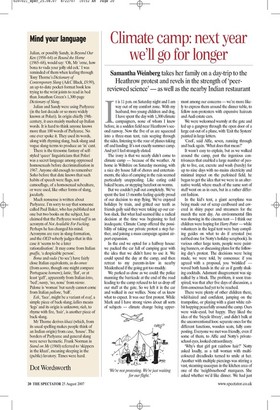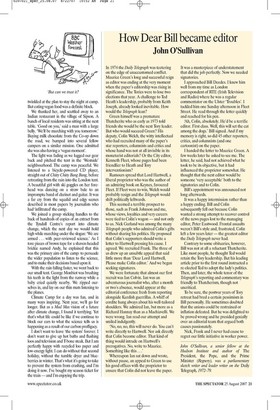Climate camp: next year we'll go for longer
Samantha Weinberg takes her family on a day-trip to the Heathrow protest and revels in the strength of 'peerreviewed science' — as well as the nearby Indian restaurant 1 t is 11 p.m. on Saturday night and I am way out of my comfort zone. With my husband, two young children and dog, I have spent the day with 1,300 climate campaigners, none of whom I knew before, in a sodden field near Heathrow's second runway. Now the five of us are squeezed into a three-man tent, rain seeping through the sides, listening to the roar of planes taking off and landing. It's not exactly summer camp. And yet I feel strangely elated.
The irony is that we nearly didn't come to climate camp — because of the weather. At home in Wiltshire on Saturday morning, with a nice dry house full of chores and entertainments, the idea of camping in the rain seemed particularly unappealing. Like eating cold baked beans, or stepping barefoot on worms.
But we couldn't pull out completely. We've spent the last 13 months feeling quietly proud of our decision to stop flying. We've enjoyed holidays by train, and gritted our teeth as friends gaily said they were taking up our carbon slack. But what had seemed like a radical decision at the time was beginning to feel inadequate. Climate Camp offered the possibility of taking our private protest a step further, and joining a mass campaign against airport expansion.
In the end we opted for a halfway house: we packed the car full of camping gear with the idea that we didn't have to use it. We could spend the day at the camp, and then retreat to my parents-in-law in nearby Maidenhead if the going got too muddy.
We parked as close as we could: the police manning the barricade at the end of the road leading to the camp refused to let us drop off our stuff at the gate. So we left it in the car and walked in our wellies. None of us knew what to expect. It was our first protest. While Mark and I have strong views about all sorts of subjects — climate change being uppermost among our concerns — we're more likely to express them around the dinner table, to fellow non-protesters with expensive haircuts and Audi estate cars.
We were welcomed warmly at the gate and led up a gangway through the open door of a large cut-out of a plane, with 'Exit the System' painted in large letters.
'Cool', said Alfie, seven, running through and back again. 'What does that mean?'
It wasn't easy to explain, but as we walked around the camp, past the ingenious contrivances that enabled a large number of people to live, eat, excrete and wash (barely) for up to nine days with no mains electricity and minimal impact on the purloined field, he began to get the idea that we were in an alternative world, where much of the same sort of stuff went on as in ours, but in a rather different fashion.
In the kid's tent, a giant aeroplane was being made out of scrap cardboard and covered in shiny paper and streamers for the march the next day. An environmental film was showing in the cinema tent — I think our children were hoping for Harry Potter —while volunteers in the legal tent were busy compiling guides on what to do if arrested (we nabbed one for Notty's holiday scrapbook). In various other large tents, people were painting banners, or discussing plans for the following day's protest. The decisions were being made, we were told, by consensus: if you agreed with a proposal, you 1-winlded' — waved both hands in the air as if gently shaking cocktails. Adamant disagreement was signalled by a block. The problem, it soon transpired, was that after five days of discussion, a firm consensus had yet to be reached.
There were plenty of other children there, wild-haired and confident, jumping on the trampoline, or playing with a giant white rabbit hopping peacefully around the camp. Ours were wide-eyed, but happy. They liked the idea of the 'bicycle library', and didn't balk at the unconventional loos: separate ones for the different functions, wooden seats, fully composting. Everyone we met was friendly, even if some of them, to Alfie and Notty's privateschool eyes, looked extraordinary.
'Why's that girl got rainbow hair?' Notty asked loudly, as a tall woman with multicoloured dreadlocks turned to smile at her. Another with multiple piercings was stirring a vast, steaming saucepan in the kitchen area of one of the 'neighbourhood' marquees. She asked whether we'd like dinner. We had just twinkled at the plan to stay the night at camp. But eating vegan food was a definite block.
We thanked her, and scuttled away to an Indian restaurant in the village of Sipson. A bunch of local residents was sitting at the next table. 'Good on you,' said a man with a large belly. 'We'll be marching with you tomorrow.' Buying milk chocolate from the Co-op down the road, we bumped into several fellow campers on a similar mission. One admitted she was also having a 'vegan moment'.
The light was fading as we lugged our gear back and pitched the tent in the Westside' neighbourhood. The camp was peaceful. We listened to a bicycle-powered CD player, straight out of Chitty Chitty Bang Bang, before retreating from the rain into the London tent. A beautiful girl with ski goggles on her forehead was dancing on a straw bale to an impromptu band of clarinet and guitar. It was a far cry from the squalid and edgy scenes described in most papers by journalists who had 'infiltrated' the camp.
We joined a group sticking handles to the back of hundreds of copies of an extract from the Tyndall Centre's report into climate change, which the next day we would hold high while marching under the slogan: 'We are armed . . . with peer-reviewed science.' As I tore pieces of brown tape for a shaven-headed brickie named Andy, he explained that this was the primary aim of the camp: to persuade the wider population to listen to the science, and to make their decisions based upon it.
With the rain falling faster, we went back to our small tent. George Monbiot was brushing his teeth in the light from the runway while a baby cried quietly nearby. We zipped ourselves in, and lay on our thin mats listening to the planes.
Climate Camp for a day was fun, and in many ways inspiring. Next year, we'll go for longer. But as a Mad Max vision of a future after climate change, I found it ten-ifying. Yet that's what life could be like if we continue to block our ears to what the science tells us is happening as a result of our carbon profligacy.
I don't want to leave `the system' forever. I don't want to give up hot baths and flushing loos and television and T-bone steak. But I am perfectly happy with recycled loo paper and low-energy light. I can do without that second holiday, without the tumble dryer and blueberries in winter. That's what it's going to take to prevent the system from crashing, and I'm doing it now. I've bought my season ticket for the train — and I'm enjoying the trip.










































 Previous page
Previous page